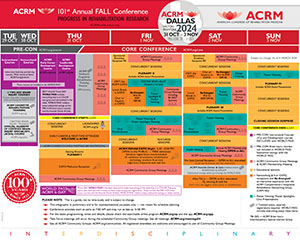Full Schedule
Not registered yet? Register and SAVE 20% using the code "finaldays20" at checkout. DETAILS: ACRM.org/finaldays20
QUESTIONS? Email —>meetings@acrm.org
Full Schedule
- Wednesday, October 30, 2024
-
1:30 PM – 5:30 PMIC13: Neurologic Music Therapy (NMT)®: An Introduction to Science, Theory and Practice
- Thursday, October 31, 2024
-
2:30 PM – 3:30 PMEffects and Mechanisms of Exercise on Brain-derived Neurotrophic Factor Levels and Clinical Outcomes in People with Parkinson’s Disease: A Systematic Review and Meta-analysis
-
2:30 PM – 3:30 PMNIDILRR ARRT Fellows SymposiumCorresponding Presenter: Linda Vo, MPH (she/her/hers) – National Institute on Disability, Independent Living, and Rehabilitation ResearchModerator: Allen W. Heinemann, PhD FACRM (he/him/his) – Northwestern University Feinberg School of MedicineTechnologyAging Research & Geriatric RehabilitationClinical PracticeDiversity, Equity and Inclusion
-
2:30 PM – 3:30 PMNon-Traumatic Spinal Cord Injury Part I - Characteristics and Outcomes of Patients from the Model System Pilot Study and National Data for Older Americans
-
6:00 PM – 7:30 PMPLENARY I: Shaping Hope: Empowering Minds Through Alzheimer's Rehabilitation 0881
- Friday, November 1, 2024
-
8:15 AM – 9:15 AMHarnessing Waves of Wellness: Benefits of Aquatic Exercise for Aging Adults' Cardiometabolic Health, Cognitive Ability, and Functional Mobility
-
8:15 AM – 9:15 AMScience Update: Rehabilitative Management of Non-Motor Features in Parkinson Disease
-
1:15 PM – 2:15 PMEarly Identification of Persons Living with Dementia at Point-of-Care Hospitalization Using the Electronic Health Record in Addressing Readmissions
-
1:15 PM – 2:15 PMFall-related Head Impact in Older Adults
-
1:15 PM – 2:15 PMSPECIAL SYMPOSIUM: Making an Impact: Tips on Conducting and Disseminating Policy-relevant Research
-
1:15 PM – 2:15 PMState of the Science on Mild Cognitive Impairment and Motoric Cognitive Risk syndrome
-
1:15 PM – 2:15 PMState of the Science: Dance and Neurorehabilitation
-
3:00 PM – 4:00 PMAging Research & Geriatric Rehabilitation Oral PresentationsAging Research & Geriatric Rehabilitation
-
3:00 PM – 4:00 PMMeasurement Oral Presentations
-
3:00 PM – 4:00 PMSpinal Cord Injury Interdisciplinary Special Interest Group Oral Presentations
Moderator: Catherine J. VanDerwerker, PT, DPT, PhD – Ralph H. Johnson VAMC and the Medical University of South Carolina
-
3:00 PM – 5:00 PMAging Research & Geriatric Rehabilitation Oral Presentations
-
4:15 PM – 5:15 PMChanges in Bone Parameters in Response to Electrical Stimulation Exercise after Spinal Cord Injury
-
4:15 PM – 5:15 PMFrailty Measurement and Management: A Multidisciplinary Perspective
-
4:15 PM – 5:15 PMPressure Ulcers, Prevention and Treatment: A basic toolbox for the rehabilitation specialist with Focus on Quality of life
-
4:15 PM – 5:15 PMThe Effect of Perturbations on Postural Control in Older Adults with Cognitive Impairment
-
4:15 PM – 5:15 PMThe Role of Rehabilitation Medicine in Addressing the Public Health Crisis of Exposure to Environmental Toxins
- Saturday, November 2, 2024
-
8:15 AM – 9:15 AMDementia Prevention 2024 Session I
-
10:30 AM – 11:30 AMDementia Prevention 2024: Sleep, Diet, and Reversing Age-related Cognitive Decline: Evidence from Translational Studies-
-
10:30 AM – 11:30 AMFrailty in Multiple Sclerosis: Epidemiology, Assessment, and Intervention Strategies
-
11:45 AM – 12:45 PMAging Research & Geriatric Rehabilitation Networking Group
-
2:45 PM – 3:45 PMPain Rehabilitation Oral Presentations
-
4:00 PM – 5:00 PMAdvances and Challenges in Using Evidence-based AI Driven Technology Platforms for Cognitive and Speech Therapy to Increase Patient Outcomes and Improve Clinician Productivity
-
4:00 PM – 5:00 PMNew Development in Measuring Cognitive Function in Rehabilitation: Measurement Options for Use in Research, Clinical Screening, and Remote Assessment
-
4:00 PM – 5:00 PMPhysical Activity Behaviors in Older Adults among Ethnic and Racial Minorities: Challenges and Opportunities
-
4:00 PM – 5:00 PMSuicide Prevention and Firearm Safety in Rehabilitation Patients
-
4:00 PM – 5:00 PMWhere to Start? Identifying Datasets for Rehabilitation and Disability Health Services Research
- Sunday, November 3, 2024
-
8:15 AM – 9:15 AMThe Effects of Therapeutic Singing and Expiratory Muscle Strength Training on Cough and Respiratory Control in Parkinson’s Disease
-
12:45 PM – 1:45 PMAdvancements in Rehabilitation Sciences: 2024 Progress Report From the Alzheimer’s Disease Task Force
-
12:45 PM – 1:45 PMCulturally Adapted Dementia Caregiver Training and Support for Diverse Caregivers
-
12:45 PM – 1:45 PMFundraising, Incorporation, and Other Technology Startup Basics: A Panel Discussion Hosted by Startups Founders and Early-stage Employees
-
12:45 PM – 1:45 PMLeveraging Matching and Weighting Approaches in Rehabilitation Health Services Research
-
12:45 PM – 1:45 PMMusic Is Medicine: Ask the Experts
-
12:45 PM – 1:45 PMPost-Stroke Cognitive Impairment: Rehabilitation Strategies and SMART Goal Setting for people who experienced stroke
-
12:45 PM – 1:45 PMUpdate on Solutions for Increasing Use of Integrative Medicine in Speech Language Pathology and Audiology
-
2:00 PM – 3:00 PMLeveraging Social Determinants of Health Data to Improve Post-Acute Stroke Outcomes: Implications for Practice
-
2:00 PM – 3:00 PMProviding Frailty Index-driven Outpatient Rehabilitation Services During Cancer Treatment: Insights from Research and Clinical Practice
-
2:00 PM – 3:00 PMSPECIAL SYMPOSIUM: “Get up Offa That Thing, and Dance ‘til You Feel Better!” the Why and How of Encouraging Dance for People with Parkinson Disease
-
3:00 PM – 4:15 PMCLOSING PLENARY: The Voice of Parkinson’s: Evidence for Singing as Medicine 0882

.jpg)
.jpg)
.jpg)
